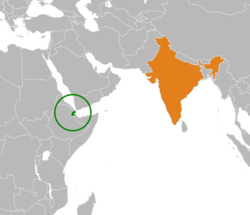Djibouti–India relations
 |
|
Djibouti |
India |
|---|---|
Djibouti–India relations are bilateral relations between Djibouti and India.
History
Contacts between India and Djibouti have existed since ancient times. The port of Adulis was the hub of maritime trade where Indian seafarers traded spices and silk for gold and ivory.[1] Djiboutian traders traded in hides and skins for Indian perfumes and spices.[2]
Development cooperation
President of Djibouti Ismaïl Omar Guelleh made visit to India in May 2003. India has extended a line of credits to set up an 600 TPD cement plant at Ali Sabieh.[3] The Indian community in Djibouti is around 600 people, the oldest Indian community is Gujarati traders.[4]
Agreements
On 31 January 1989, the governments of Djibouti and India signed a Cultural Cooperation Agreement. Djibouti also signed a Memorandum of Understanding with the Telecommunication Consultants of India for implementation of the Pan-African e-Network project on Tele-education and Telemedicine. Additionally, a Civil Aviation Agreement and Bilateral Investment Promotion and Protection Agreement (BIPPA)s was signed in New Delhi on 19 May 2003.[5]
Visa Policy
Nationals of any country can obtain a visa on arrival except the nationals of India, Syria and Yemen.
See also
References
- ↑ Reade. Indian Ocean In Antiquity.
- ↑ http://mea.gov.in/Portal/ForeignRelation/Djibouti-March-2012.pdf
- ↑ "How tiny Djibouti is helping India combat piracy in Indian Ocean". Firstpost.
- ↑ http://mea.gov.in/Portal/ForeignRelation/Djibouti_April_2014.pdf#page=3
- ↑ http://mea.gov.in/Portal/ForeignRelation/Djibouti-March-2012.pdf#page=2
| Wikimedia Commons has media related to Relations of Djibouti and India. |

